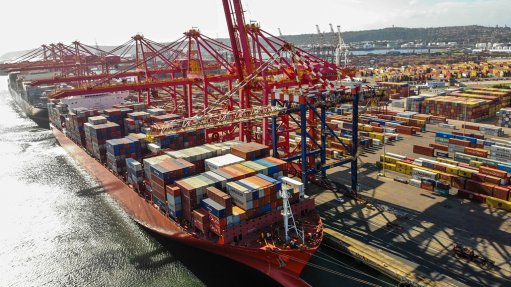Bargaining Councils Can Play a Meaningful role in Combatting Construction Mafia Disruptions
This article has been supplied and will be available for a limited time only on this website.
South Africa’s construction sector is being systematically undermined by criminal syndicates. Commonly referred to as the “construction mafia,” these groups extort, intimidate, and sabotage construction projects across the country. Their actions not only threaten worker safety but also stall critical infrastructure development, increase costs, and damage investor confidence.
According to Deputy Minister of Public Works Sihle Zikalala, disruptions caused by so-called “construction mafia” groups have cost South Africa an estimated R63 billion between 2019 and 2024. In the Western Cape alone, six major construction projects, collectively worth over R400 million, were halted last year due to the actions of criminal syndicates.
“These criminal networks are not simply disruptive, they’re deeply embedded in some areas and operate with increasing sophistication,” says Danie Hattingh, spokesperson for business at the Building Industry Bargaining Council (BIBC). “But through collaboration and responsible oversight, bargaining councils can help identify and isolate illegitimate players posing as contractors or community representatives.”
The “construction mafia” initially emerged around 2015, often misrepresented as attempts at economic transformation. Exploiting clauses in procurement policy, particularly the requirement that 30% of public contracts benefit local communities, these groups claimed to represent local interests.
“What began as calls for inclusion quickly devolved into extortion and violence,” says Hattingh. “We have seen armed site invasions, demands for ‘protection fees,’ sabotage of equipment, and even threats to life. These are not empowerment activists. These are criminal syndicates exploiting legitimate policies for personal gain.”
The impact has been severe. Forced stoppages and heightened security requirements have led to significant project delays and cost overruns. Investor and contractor confidence has declined, especially among smaller firms and international stakeholders. Job losses and slower infrastructure delivery have negatively affected both the economy and local communities. Skilled professionals are leaving high-risk areas, resulting in a loss of expertise and capacity. Critical projects such as schools, housing, and hospitals face mounting delays and ballooning budgets. Perhaps most concerning is the growing sense of fear and insecurity among workers and contractors on the ground.
Contractors, workers, and even government officials have reported intimidation, assaults, and in some cases, killings. Armed gangs have stormed construction sites demanding a cut of the project (usually 30%, under the false interpretation of local empowerment policies).
Syndicates thrive in an environment of weak enforcement, vague regulation, and fragmented oversight. Labour laws are inconsistently enforced, and under-resourced inspectors struggle to monitor all sites. Procurement frameworks lack clarity, enabling unvetted individuals to claim community representation. Smaller contractors often operate informally and without legal support, making them particularly vulnerable.
“The construction mafia exploits every gap,” says Hattingh. “They scare and threaten without facing any punishment or consequences, manipulate the tender process, and operate freely due to legal delays and poor coordination between stakeholders.”
Despite these challenges, the BIBC believes that working with organisations like Business Against Crime South Africa (BAC) and dedicated SAPS anti-extortion task teams, can help to turn the tide by playing a key role in identifying fraudulent activity within its jurisdiction.
“We actively track contractor activity through our Employee Benefit Administration system,” explains Hattingh. “If someone linked to corrupt activity attempts to bribe one of our agents or issues threats, we escalate the case immediately to SAPS and BAC.”
The BIBC also engages with international organisations like the Global Initiative Against Transnational Organized Crime (GI-TOC) to stay informed about trends and emerging threats. This level of insight allows the BIBC to support coordinated action and encourage legitimate contractors to stand firm against criminal interference.
“We’re no longer in a position where contractors feel totally alone,” says Hattingh. “Our partnerships give them a structured avenue to report incidents and push back with the support of the law.”
Although the threat remains significant, there are signs of progress. “Yes, we still need to convince more businesses to break their silence,” Hattingh admits. “But there’s momentum now. We see greater willingness to collaborate and a shared recognition that this issue cannot be ignored.”
The BIBC advocates for several practical interventions:
- Regional threat-tracking systems to improve early warning and response.
- Mandatory anti-extortion clauses in all subcontract agreements.
- Rapid response task teams, co-ordinated with SAPS and municipal governments.
- Legal toolkits and education programmes for small and mid-sized contractors.
- Stronger oversight of local business forums to distinguish legitimate voices from criminal fronts.
Ultimately, Hattingh believes that long-term success will come when only registered, law-abiding contractors are permitted to operate. Bargaining councils, with their established infrastructure and employer networks, are ideally placed to enforce this.
“If you want to do business in the Greater Peninsula, Boland, or Overstrand regions, you need to be registered with the BIBC,” says Hattingh. “That gives us a direct line of accountability, and it gives the industry a filter to help keep criminals out.”
To other industries facing similar threats, the message is clear: unite, formalise, and act.
“The construction mafia thrives on fear and fragmentation,” Hatting concludes. “But with unified action, clear policies, and robust oversight, the industry can push back. Bargaining councils are critical allies in restoring integrity and ensuring that economic empowerment is genuine and not hijacked by criminals.”
Comments
Press Office
Announcements
What's On
Subscribe to improve your user experience...
Option 1 (equivalent of R125 a month):
Receive a weekly copy of Creamer Media's Engineering News & Mining Weekly magazine
(print copy for those in South Africa and e-magazine for those outside of South Africa)
Receive daily email newsletters
Access to full search results
Access archive of magazine back copies
Access to Projects in Progress
Access to ONE Research Report of your choice in PDF format
Option 2 (equivalent of R375 a month):
All benefits from Option 1
PLUS
Access to Creamer Media's Research Channel Africa for ALL Research Reports, in PDF format, on various industrial and mining sectors
including Electricity; Water; Energy Transition; Hydrogen; Roads, Rail and Ports; Coal; Gold; Platinum; Battery Metals; etc.
Already a subscriber?
Forgotten your password?
Receive weekly copy of Creamer Media's Engineering News & Mining Weekly magazine (print copy for those in South Africa and e-magazine for those outside of South Africa)
➕
Recieve daily email newsletters
➕
Access to full search results
➕
Access archive of magazine back copies
➕
Access to Projects in Progress
➕
Access to ONE Research Report of your choice in PDF format
RESEARCH CHANNEL AFRICA
R4500 (equivalent of R375 a month)
SUBSCRIBEAll benefits from Option 1
➕
Access to Creamer Media's Research Channel Africa for ALL Research Reports on various industrial and mining sectors, in PDF format, including on:
Electricity
➕
Water
➕
Energy Transition
➕
Hydrogen
➕
Roads, Rail and Ports
➕
Coal
➕
Gold
➕
Platinum
➕
Battery Metals
➕
etc.
Receive all benefits from Option 1 or Option 2 delivered to numerous people at your company
➕
Multiple User names and Passwords for simultaneous log-ins
➕
Intranet integration access to all in your organisation


















